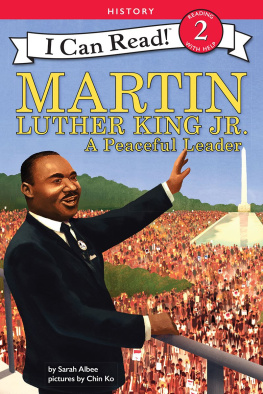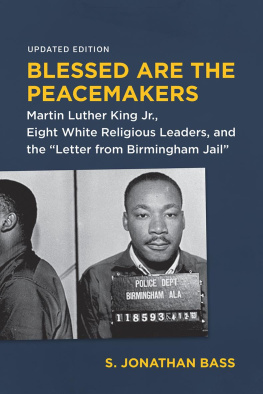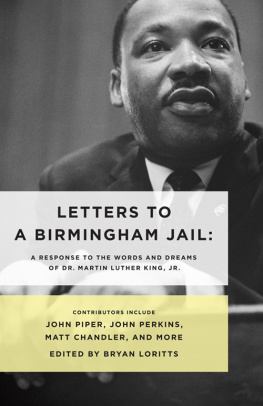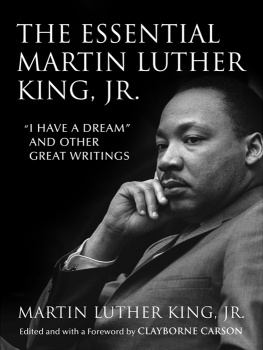The Word of the Lord Is Upon Me: The Righteous Performance of Martin Luther King, Jr.
Canarsie: The Jews and Italians of Brooklyn Against Liberalism
The Fractious Nation: Unity and Division in Contemporary
American Life (edited)

For Catherine
Contents
May 17, 1954 | Supreme Court hands down Brown v. Board of Education. |
June 5, 1956 | Alabama Christian Movement for Human Rights (ACMHR) is founded in Birmingham. |
December 5, 1956 | Blacks in Montgomery, Alabama, begin bus boycott. |
February 14, 1957 | Southern Christian Leadership Conference (SCLC) is founded. |
May 14, 1961 | Freedom Riders are attacked at Birminghams Trailways bus station. |
December 15, 1961 | Rev. Martin Luther King, Jr., makes first speech in Albany, Georgia. |
July 1962 | King is arrested and jailed twice in Albany. |
November 6, 1962 | George Wallace is elected governor of Alabama. |
January 1011, 1963 | King and colleagues decide to launch Birmingham campaign. |
January 14, 1963 | Wallace is inaugurated. |
January 1417, 1963 | National Conference on Race and Religion is held in Chicago. |
January 16, 1963 | Alabama clergy issue An Appeal for Law and Order and Common Sense. |
March 5, 1963 | Birmingham mayoral election results in runoff. |
April 2, 1963 | Albert Boutwell wins runoff election. |
April 3, 1963 | Birmingham protests begin. |
April 12, 1963 | King is arrested and jailed on Good Friday. |
April 12, 1963 | White clergy issue statement criticizing Birmingham demonstrations. |
April 16, 1963 | Date placed on the Letter from Birmingham Jail. |
April 20, 1963 | King is released from jail. |
May 2, 1963 | D-day: The Childrens Crusade begins. |
May 3, 1963 | Birmingham deploys fire hoses and police dogs against demonstrators. |
May 10, 1963 | Settlement is announced. |
June 11, 1963 | Two black students integrate the University of Alabama. |
June 11, 1963 | President John F. Kennedy delivers speech on race to the nation. |
June 12, 1963 | The Letter from Birmingham Jail appears in the Christian Century. |
August 1963 | The Letter from Birmingham Jail appears in the Atlantic. |
August 28, 1963 | King delivers I Have a Dream at the March on Washington. |
September 15, 1963 | Sixteenth Street Baptist Church in Birmingham is bombed. |

The image that traveled around the world: At a critical moment for Birmingham and the civil rights movement, the authorities display their brutality. When President John F. Kennedy saw this picture of a police dog mauling a bystander during the protests against segregation, he said that it made him sick. ( Bill Hudson/AP/Corbis)
On Good Friday, April 12, 1963, Martin Luther King, Jr., was arrested, booked, and jailed in Birmingham, Alabama. He had violated a courts injunction against marches during the battle to desegregate that city, a notorious bastion of racist terror. King was convinced that if the movement could triumph there, the walls of Southern segregation would crumble. While behind bars, he wrote the Letter from Birmingham Jail. At the very beginning, King declared, Just as the Apostle Paul left his village of Tarsus and carried the gospel of Jesus Christ to the far corners of the Greco Roman world, so am I compelled to carry the gospel of freedom beyond my own hometown.
Smarting from a recent setback in Albany, Georgia, and hungry for a civil rights victory, King had carried that gospel to Birmingham in early 1963. He had envisioned a massive campaign of nonviolent protest that would wield the leverage of an Easter season boycott to integrate Birminghams downtown stores. But with the insurgency faltering in the first weeks of April, King needed a dramatic stroke. He decided to court arrest. The authorities obliged and put him behind bars. While in jail, he read a statement in the local newspaper from eight local white clergymen, all self-described racial moderates. They branded King and his colleagues outsiders and extremists, rejected the demonstrations as untimely, and chided the protesters for precipitating violence. The Letter began as Kings retort to the clergymen.
For Kings closest colleagues, the Letter provided nothing less than the moral and philosophical foundations of their movement. Over the next fifty years, the stature of the Letter spread beyond the events that spawned it. It has been hailed as one of our nations literary treasures, compared with the Gettysburg Address and mile Zolas JAccuse, and studied in countless college and high school classrooms. The Letter earned King a place alongside Gandhi and Thoreau as a champion of civil disobedience. The influence of its vision of nonviolent direct action rippled across the globe to insurgents in Soweto, Prague, and Beijing. Kings wordsthe bristling at those who tell the oppressed to wait for a more convenient season, the steely conviction of the irrepressible force of freedom in the worldhave resonated among freedom fighters long after the Letter was written.
The Letters broad appeal pays homage to the universalist stance in Kings lofty opening: I am in Birmingham because injustice exists here. But King was also there because my people, as he often referred to fellow blacks, were suffering. Kings Christian faith in his Saviors love for all Gods children suffuses the Letter, but its driving force is black pain and anger. Those twin imperatives match the larger duality of Kings life: action and argument, exhorting blacks and persuading whites. There was always a two-way flow between those two realms: The defiant purpose of the black uprising spilled into the Letter; the Letters arguments about iniquity and its remedy flowed back into mass meetings, freedom songs, and marches.
The Birmingham struggle gave rise to events that forever changed our nation. The images from those months in the spring and summer of 1963 are now an indelible part of our national history: the citys black youth defying the fire hoses and dogs of policemen dispatched to maintain white supremacy; the movements leaders galvanizing the protest with rousing sermons and freedom songs like Aint Gonna Let Nobody Turn Me Around; President John Kennedy addressing the nation in June, finally defining civil rights as an urgent moral issue and national priority; and blacks and whites gathering at the Lincoln Memorial in August for the March on Washington to hear King deliver I Have a Dream.
The battle for civil rights was not finally won in the months King called the long summer of our discontent. The Civil Rights Act, which banned discrimination in public accommodations, was not passed until the following year. Black defiance continued to spread across America. Battles with names like St. Augustine and Selmamodern equivalents of Antietam, Gettysburg, and Bull Runlay ahead. On September 15, 1963, in a racist revenge killing, the bombing of Sixteenth Street Baptist Church in Birmingham took the lives of four little black girls. The white backlash was just gathering force in the North. Still, after Birmingham, the foundations of the nations old racial order cracked in some elemental way and set the groundwork for the new one we live in today. The Letter from Birmingham Jail, the vision of nonviolence it argued for, and the disinherited children of God it sanctified played a critical part in dismantling Jim Crow.









